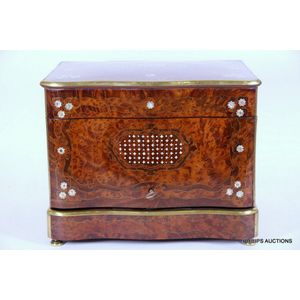French inlaid walnut liqueur box with mother-of-pearl embellishments
You must be a subscriber, and be logged in to view price and dealer details.
Subscribe Now to view actual auction price for this item
When you subscribe, you have the option of setting the currency in which to display prices to $Au, $US, $NZ or Stg.
- Tantalus - A tantalus is a container for holding two or three glass or crystal bottles of alchoholic drinks. A tantalus may take various forms, the most common being made from silver, silver plate or wood with the three bottles in a circle or two bottles in line with a central handle. A larger version has three bottles in a line with two end supports and a horizontal top and handle. To prevent unauthorised access, some tantalus have a locking mecahnism that prevents the bottles and stoppers being removed from the bottles when secured.
A box tantalus, as the name implies is an elaborate wooden box made of a fancy timber such as coramandel, with divisions for the bottles and a lockable lid. Some of these type are designed for liquers and include the liquer glasses set into fitted holders. - Cartouche - An ornamental panel in the form of of a shield, oval or rectangular scroll with curling edges. It may be carved into the back of a chair or the top of a sideboard, or present on a piece of silver or jewellery, and contain the initials of the original owner, heraldic symbols, or some other inscription, such as the details of a presentation.
In ceramics the term defines the central area of a vase or similar with a decorative border in one of the shapes above, into which a decorative scene or figures have been painted. - Bronze - An alloy of copper and tin, traditionally in the proportions of about 9 parts of copper to 1 part of tin.
The discovery of bronze in Western Asia in the 4th century enabled people to create metal objects which were superior to those previoulsy possible because of its strength and hardness, and it has been used throughout the world for weapons, coins, tools, statuary and other decorative items.
It is very fluid in a molten state, and its hardness, strength when set, and non-corrosive properties makes it most suitable for casting sculpture. - Mother-Of-Pearl - Mother-of-pearl, technical name "nacre", is the inner layer of a sea shell. The iridescent colours and strength of this material were widely used in the nineteenth century as an inlay in jewellery, furniture, (especially papier mache furniture) and musical instruments.
In the early 1900s it was used to make pearl buttons. Mother-of-pearl is a soft material that is easily cut or engraved.
Nowadays it is a by-product of the oyster, freshwater pearl mussel and abalone industries.
This item has been included into following indexes:
Visually similar items

A painted pine prie-dieu, (prayer desk) Italian, possibly Romagna, circa 1680. 98 cm high, 82 cm wide, 61 cm deep

A finely inlaid box by Eugenio Quarti (1867-1926), 19th century, the walnut rectangular box with brass edging and a swing handle to the lid, exquisitely inlaid in the Moorish taste with delicate copper and brass stringing and designs, with mother-of-pearl

Chinese Camphorwood trunk / chest, dome top with two doors, and carved fitted interior, carved Scenery of a harbour, brass fittings

A Japanese carved wood, ivory, mother of pearl and gilt lacquer single bed, Meiji period (1868-1912) 184 x 123 cm
